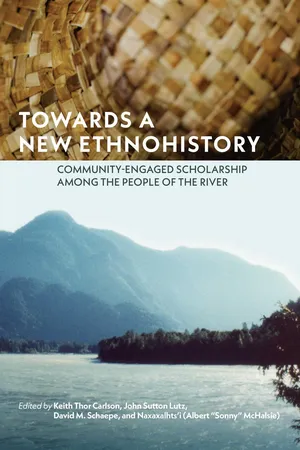
Towards a New Ethnohistory
- 304 pages
- English
- ePUB (mobile friendly)
- Available on iOS & Android
Towards a New Ethnohistory
About this book
Towards a New Ethnohistory engages respectfully in cross-cultural dialogue and interdisciplinary methods to co-create with Indigenous people a new, decolonized ethnohistory. This new ethnohistory reflects Indigenous ways of knowing and is a direct response to critiques of scholars who have for too long foisted their own research agendas onto Indigenous communities. Community-engaged scholarship invites members of the Indigenous community themselves to identify the research questions, host the researchers while they conduct the research, and participate meaningfully in the analysis of the researchers' findings.
The historical research topics chosen by the Stó: l? community leaders and knowledge keepers for the contributors to this collection range from the intimate and personal, to the broad and collective. But what principally distinguishes the analyses is the way settler colonialism is positioned as something that unfolds in sometimes unexpected ways within Stó: l? history, as opposed to the other way around.
This collection presents the best work to come out of the world's only graduate-level humanities-based ethnohistory field school. The blending of methodologies and approaches from the humanities and social sciences is a model of twenty-first century interdisciplinarity.
Tools to learn more effectively

Saving Books

Keyword Search

Annotating Text

Listen to it instead
Information
Table of contents
- PROLOGUE
- MAP
- INTRODUCTION: Decolonizing Ethnohistory
- ONE: Kinship Obligations to the Environment: Interpreting Stó:lō Xexá:ls Stories of the Fraser Canyon
- TWO: Relationships: A Study of Memory, Change, and Identity at a Place Called I:yem
- THREE: Crossing Paths: Knowing and Navigating Routes of Access to Stó:lō Fishing Sites
- FOUR: Stó:lō Ancestral Names, Identity, and the Politics of History
- FIVE: Caring for the Dead: Diversity and Commonality Among the Stó:lō
- SIX: Food as a Window into Stó:lō Tradition and Stó:lō-Newcomer Relations
- SEVEN: "Bringing Home All That Has Left": The Skulkayn/Stalo Heritage Project and the Stó:lō Cultural Revival
- EIGHT: Totem Tigers and Salish Sluggers: A History of Boxing in Stó:lō Territory, 1912–1985
- NINE: "I Was Born a Logger": Stó:lō Identities Forged in the Forest
- TEN: "They're Always Looking for the Bad Stuff": Rediscovering the Stories of Coqualeetza Indian Hospital with Fresh Eyes and Ears
- EPILOGUE: Next Steps in Indigenous Community-Engaged Research: Supporting Research Self-Sufficiency in Indigenous Communities
- ACKNOWLEDGEMENTS
- BIBLIOGRAPHY
- CONTRIBUTORS
Frequently asked questions
- Essential is ideal for learners and professionals who enjoy exploring a wide range of subjects. Access the Essential Library with 800,000+ trusted titles and best-sellers across business, personal growth, and the humanities. Includes unlimited reading time and Standard Read Aloud voice.
- Complete: Perfect for advanced learners and researchers needing full, unrestricted access. Unlock 1.4M+ books across hundreds of subjects, including academic and specialized titles. The Complete Plan also includes advanced features like Premium Read Aloud and Research Assistant.
Please note we cannot support devices running on iOS 13 and Android 7 or earlier. Learn more about using the app